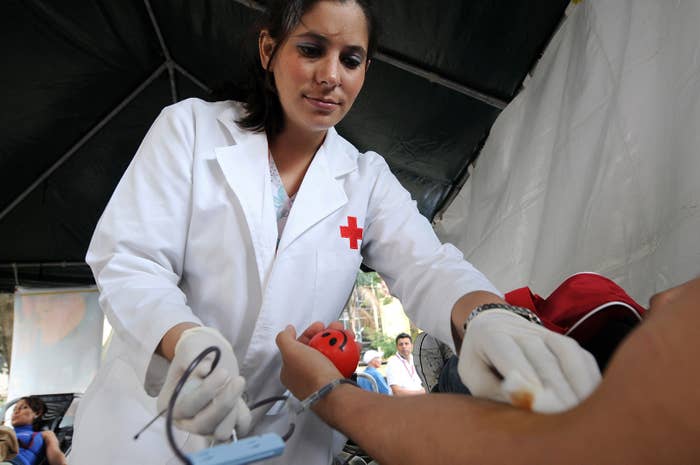
The Food and Drug Administration released draft guidance Tuesday that recommends reforming a three-decade-old rule that bans blood donations from men who have had sex with another man.
The draft guidance is posted here.
U.S. Senator Tammy Baldwin of Wisconsin hailed the proposal as progress, but said in a statement to BuzzFeed News that "it doesn’t go far enough."
The existing policy, implemented amid the HIV/AIDS epidemic, has been widely criticized by medical and LGBT organizations in recent years as outdated and a scientifically unjustifiable form of discrimination. Existing guidelines have also been used to ban transgender people from donating blood, regardless of their gender.
Under the recommendations, to be submitted Friday to the federal register for public comment, blood donations would be allowed from gay and bisexual men — but only if they have abstained from sex with another man in the previous year.
The draft guidelines state:
Male donors previously deferred because of a history of sex with another man, even one time, since 1977, may be eligible to donate provided that they have not had sex with another man during the past 12 months and they meet all other donor eligibility criteria.
Male donors deferred because of a history of sex with another man in the past 12 months may be eligible to donate provided they have not had sex with another man during the past 12 months and they meet all other donor eligibility criteria.
With regard to trans people, the recommendations explain, "In the context of the donor history questionnaire, male or female gender is taken to be self-identified and self-reported. In instances where a donor has asserted a change in gender identification, medical directors may exercise discretion with regard to donor eligibility."
Critics were quick to point out Tuesday that the new proposal policy would continue to function as a ban for many gay men and bisexual men who have sex more than once a year.
While Senator Baldwin said she was “encouraged that the FDA is moving forward with guidance" to lift the lifetime ban, she said a one-year deferral should not be the final goal. "This is a first step in ending an outdated policy that is medically and scientifically unwarranted, but it doesn’t go far enough."
Ian Thompson, legislative representative American Civil Liberties Union, argued that "this inadequate proposal must be seen as part of ongoing process and not an end point. Deferral decisions should be based on activities presenting an elevated risk, not on the identity of a person or that person’s partner."
Thompson added that the recommendation "continues to stigmatize their intimate relationships and will indefinitely bar them from donating. In addition, this proposal leaves open the possibility that transgender individuals will continue to be needlessly barred from being able to donate."
The draft guidance fleshes out details of a bare-bones proposal announced in December by officials for the Food and Drug Administration — a subdivision of the Health and Human Services (HHS).
Just before the December announcement, a group of 80 congressional Democrats, including Senator Baldwin, sent HHS secretary Sylvia Burwell a letter calling for her to move toward a risk-based policy that assesses blood donors based on behavior that makes them more likely to contract HIV, rather than their sexual orientation. They also pushed to improve blood screening mechanisms but said a new policy should not hinge on those mechanisms being implemented.
Picking up where the December letter left off, Sen. Baldwin said in her statement Tuesday, "I look forward to continuing to work with the Administration and stakeholders to implement this first phase swiftly so we can soon achieve our ultimate goal of blood donation policies that are based on individual risk factors, that don’t unfairly single out one group of individuals, and that allow all healthy Americans to donate.”
The draft guidance essentially argues that it has found a middle-ground between a lifetime deferral and a risk-based assessment. After saying that a ban is considered discriminatory and a five-year deferral period would not make the blood supply safer, it explains that a risk-based assessment is unviable.
"The individual risk-based options were not determined to be viable options for a policy change at this time for a number of reasons," the draft guidance notes, citing the findings of a workgroup.
The workgroup dismissed a risk-based assessment, the FDA says, because "pretesting would be logistically challenging, and would likely also be viewed as discriminatory by some individuals, and individual risk assessment by trained medical professionals would be very difficult to validate and implement in our current blood donor system due to resource constraints. Additionally, the available epidemiologic data in the published literature do not support the concept that MSM who report mutual monogamy with a partner or who report routine use of safe sex practices are at low risk for HIV."
Tuesday evening, leading medical groups that advocated for the new recommendations said they were "pleased" with the proposal for gay men to abstain from sex for year before giving blood.
AABB, America’s Blood Centers, and the American Red Cross issued a statement that said they "continue to support the recommendation to change the current indefinite deferral of MSM [men who have sex with men] to a 12-month deferral."
"This change in policy would align the donor deferral period for MSM with criteria for other activities that may pose a similar risk of transfusion-transmissible infections," the groups said.
